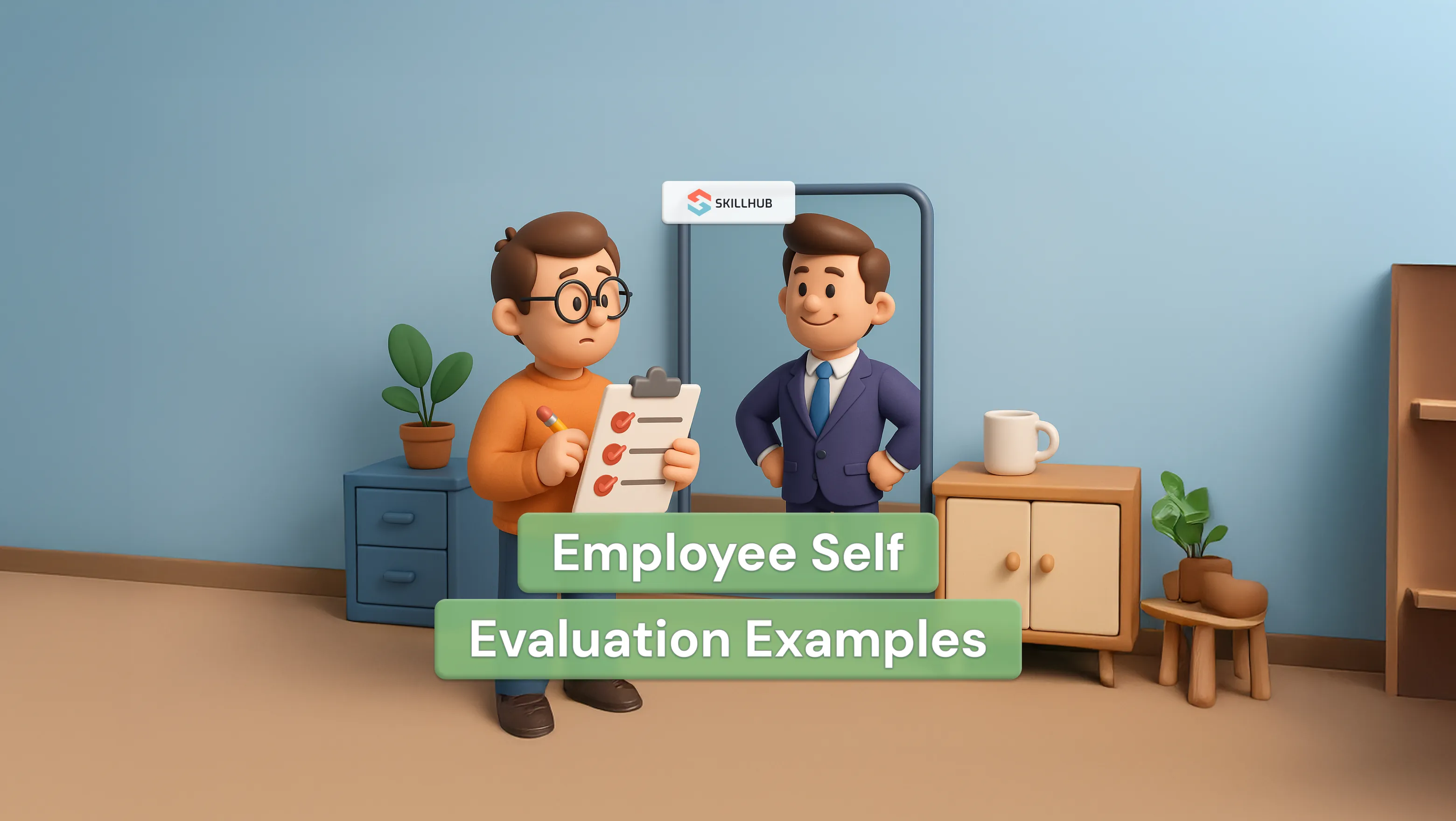40 Realistic Employee Self Evaluation Examples for Your Next Review

Describing your own performance isn’t easy. You need to show confidence without sounding full of yourself and stay honest without being too self-critical. And when you’re filling out a self-evaluation at work, that balance matters even more.
Most employee self evaluation examples from executive to administrative assistant feel awkward because no one teaches you how to do them. You’re expected to reflect on your work, show your value, and set goals—all in a few paragraphs. It’s easy to either downplay your achievements or end up writing something too vague.
This article and SkillHub give you real examples you can actually use. Whether you’re reviewing your communication skills, teamwork, or problem-solving, these sample answers will help you stay clear, professional, and real.
Employee Self Evaluation Examples
Writing your self-evaluation can feel overwhelming, especially when you’re trying to strike the right tone. The process becomes more encouraging when supported by an employee rewards software, as it helps connect self-reflection with recognition and motivates employees to highlight their achievements with confidence. You want to highlight what you’ve done well without sounding like you’re bragging, and you need to show where you want to grow without putting yourself down. To help you get started, here are realistic self evaluation examples for work. Many companies use employee training software to help staff identify skill gaps and track progress, and some employees even use tools like WriterGenerator to shape clearer, more structured self-evaluation responses. To help you get started, here are realistic self-evaluation examples for work.Many companies use employee training software to help staff identify skill gaps and track progress. To help you get started, here are realistic self-evaluation examples for work.
Communication
Strength areas
- I keep my messages clear and professional, whether I’m writing emails or speaking in meetings. I ensure that everyone receives the necessary information. I also use a LinkedIn AI assistant to write quick, creative posts and send humanized connection notes.
- I listen closely during conversations and always aim to respond thoughtfully. My team often comments on how approachable and easy to talk to I am.
Improvement areas
- I tend to rush through emails when I’m busy. I aim to enhance my clarity by dedicating more time to revising my messages.
- I sometimes avoid speaking up in large meetings, even when I have something valuable to add. I’m working on becoming more confident in group discussions.
Teamwork Self Evaluation
Strength areas
- I always step in to help when a team member is overloaded. I believe in sharing responsibility and making sure no one feels overwhelmed.
- I’m good at supporting others without taking over. I offer ideas, ask questions, and stay open to different points of view.
Improvement areas
- I sometimes focus too much on my own deadlines and forget to check in with teammates. I plan to be more proactive about offering support.
- I’ve realized I don’t always handle team disagreements well. I’m learning to address issues early and with more empathy.
Time Management
Strength areas
- At the beginning of each week, I establish clear goals and adhere to them. This practice aids in maintaining my organization and meeting deadlines. I use online appointment software to keep track of my weekly and monthly meetings.
- I use my calendar to block focused work time, which helps me avoid distractions and be more productive throughout the day. I’ve also started using a meeting assistant to automatically organize, record, and summarize discussions, which helps streamline follow-ups and reduces time spent on manual note-taking. Tools like an August calendar are especially helpful for visualizing deadlines, meetings, and personal goals in one view, and I often use an AI notes generator to instantly turn meeting discussions into clear, organized notes.
Improvement areas
- At times, I misjudge the time required for tasks. I’m working on building in more buffer time so I don’t feel rushed.
- I often check my emails too frequently during the day. I’m trying to set more boundaries to stay focused on priority work.
Adaptability
Strength areas
- I stay calm and focused when priorities shift. I’m able to adjust quickly without losing sight of the bigger goal.
- I take change as a chance to learn something new. I’m open to new tools and curious about different workflows.
Improvement areas
- When things change suddenly, I sometimes hesitate before taking action. I want to respond faster without overthinking.
- I find it hard to let go of old systems. I’m focusing on becoming more open to updates that could enhance team processes.
Problem-Solving
Strength areas
- I enjoy looking at problems from different angles and suggesting creative, realistic solutions. I stay focused on finding what works.
- When things go wrong, I take time to understand the cause before reacting. I prefer fixing issues at the root, not just the surface.
Improvement areas
- I tend to ask for help later than I should. I want to improve my ability to reach out sooner when a problem feels stagnant.
- Sometimes I rush into solutions without enough input. I’m working on taking a bit more time to consult others and test ideas.
Leadership
Strength areas
- I strive to set an example and remain calm under pressure. My team knows they can rely on me for direction and support.
- I create opportunities for others to express their ideas and lead when it aligns with their strengths. I value shared leadership, and an interactive pitch deck tool can be a great way to support this by giving everyone a clear platform to present their ideas.
Improvement areas
- I can hesitate to delegate, especially during high-stakes projects. I’m learning to trust the team more and let go of control.
- I sometimes focus more on tasks than on mentoring. I want to invest more time in helping others grow professionally.
Creativity
Strength areas
- I often bring fresh ideas to team discussions and enjoy brainstorming ways to improve our projects or workflows.
- I look for ways to simplify tasks or try new tools that might save us time or create a better result.
Improvement areas
- I can fall into a routine and forget to explore different approaches. I aim to push myself to think more creatively and explore unconventional ideas.
- I sometimes dismiss my ideas too quickly. I’m working on sharing more, even if I’m unsure how others will react.
Self-Awareness
Strength areas
- I regularly reflect on my behavior and performance. I understand the impact of my actions on the team and strive to remain centered.
- I recognize my emotional triggers and take steps to manage stress without taking it out on others.
Improvement areas
- At times, I respond defensively to feedback. I aim to prioritize listening and learning over justifying my actions.
- I don’t always notice when I’m overcommitting. I’m learning to say no and set better boundaries with my workload.
Accountability
Strength areas
- I own my work, good or bad. If something goes wrong, I take full responsibility and work to fix it.
- I follow through on my promises and keep others updated. People trust that I will accomplish tasks efficiently.
Improvement areas
- I sometimes delay giving updates when I’m behind schedule. I’m trying to be more transparent, even when things aren’t perfect.
- I can forget to track my progress when juggling multiple tasks. I’m working on using tools to stay more accountable.
Conflict Resolution
Strength areas
- I remain composed during stressful situations and concentrate on solutions rather than blaming others. I aim for fairness and respect.
- I encourage open conversations when there’s disagreement. I help the team stay focused on solving the issue, not blaming.
Improvement areas
- I sometimes avoid small conflicts, hoping they’ll go away. I’m learning to address issues early to prevent escalation.
- I can be too blunt when I’m frustrated. I’m working on using more neutral language when discussing sensitive topics.
How to Write a Self Evaluation That Gets You Noticed
Writing a self-evaluation doesn’t have to feel awkward or forced. Much like choosing the right content marketing tools to streamline your work, it’s your chance to highlight your impact and show real growth in your role. Here’s how:
- Focus on outcomes, not just tasks. Avoid simply listing your tasks. Focus on what you achieved. For example, rather than saying “I managed social media,” try “I boosted engagement by 30% in three months with targeted content.” Results make your impact clear.
- Use specific examples. Give numbers or concrete examples where you can. Phrases like “met 100% of deadlines” or “cut processing time by two hours” show real value in your self appraisal.
- Be honest about challenges. A good self-evaluation includes areas for growth. Mention what you’re working on. Briefly explain how you plan to improve. It shows maturity and self-awareness.
- Match your goals to company goals. Tie your work to the bigger picture. For example, “By improving onboarding speed, I supported the team’s goal of faster project delivery.” It connects your effort to company success. In the same way, platforms like OnlyMonster help individuals align their performance tracking with broader business goals.
- Keep the tone professional and positive. Even when mentioning weaknesses, stay constructive. Focus on learning, not complaining.
To turn these tips into a clear talking track, a short slide deck using Google Slides templates can help you lay out goals, concrete examples, and next-step actions.
Final Thoughts
Writing a self-evaluation doesn’t need to be stressful. With clear structure, real examples, and the same diligence you’d apply when running text through a plagiarism checker, you can present yourself strongly and honestly. Whether you’re crafting your own or working with professionals you pay for a resume service to assist you, using self-appraisal comments by employee example can help you write something that feels authentic and shows real value. If you're a manager gathering feedback for evaluations, consider using an anonymous online survey to encourage honest and open responses. It helps create a safe space for employees to reflect without fear of judgment.
%20(1).png)



%20(1).webp)